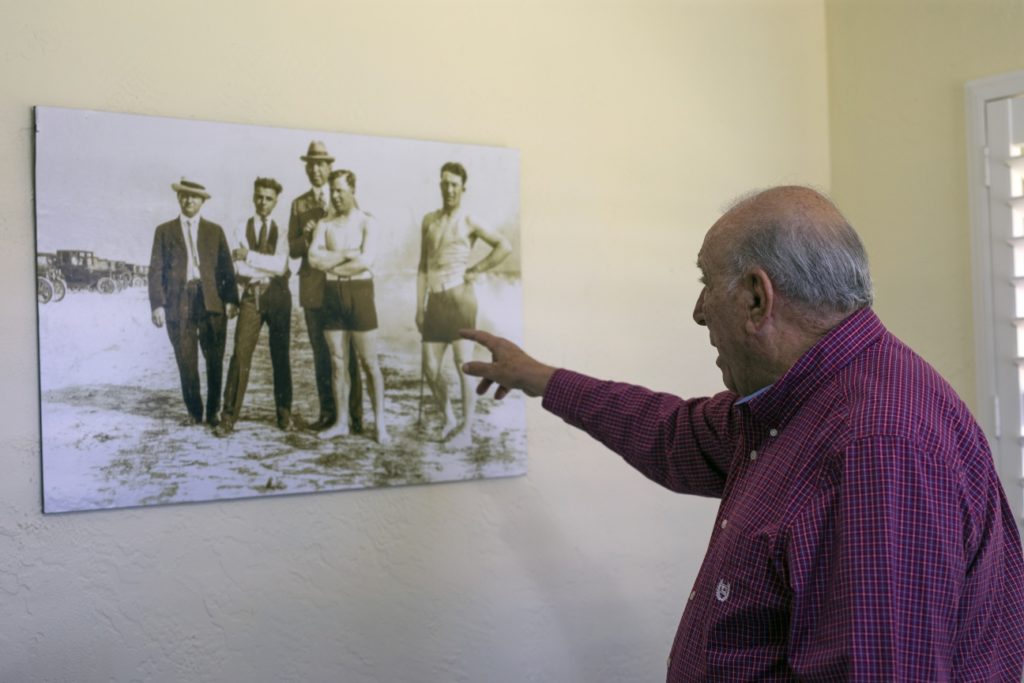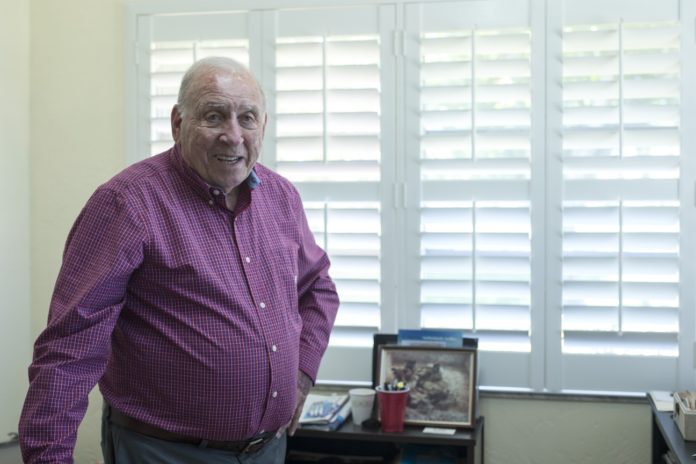Fort Myers has changed in leaps and bounds over the years. Buildings are going in up at a record pace as the population continues to swell each year, thanks to more people moving here versus vacationing. Every now and then it’s a welcomed conversation to go back in time, back when Fort Myers was still developing, and hear stories of the way life was way back when. One such story is that of Joe D’Alessandro.
Coming to Fort Myers
In the 1880s Joe D’Alessandro’s grandparents emigrated from Italy to New York City. Growing up, Joe was curious as to how his family ended up in Fort Myers because there were no Italian-Catholics living there at the time. His father had always told him that his grandfather meant to take a steam boat to Fort Myers, Virginia, to buy farmland, but because he couldn’t read or write. he accidentally got on the wrong boat.
His grandfather would smile and, with a twinkle in his eye, ask Joe, “Your father wouldn’t lie to you, would he?”
Later, Joe found out the real story. His grandfather’s daughter (Joe’s aunt) was engaged to one of four Pavese bothers who were moving down to Fort Myers to open a barber shop. Due to what was socially acceptable at the time, they couldn’t send their nineteen-year-old daughter to Florida without a guardian.
This dilemma was solved by sending Frank, her twelve-year-old brother, along to act as her chaperoned (Frank is the grandfather of Mike Scott, the former Lee County Sheriff).
Shortly after, Joe’s grandparents followed. “Italian families are funny that way …if one comes, they all come.”

Joe, a first-generation Floridian, was born in Fort Myers, and lived with his parents and four siblings off McGregor Blvd on Lynwood Ave. When he talks about growing up here, you realize just how small Fort Myers used to be.
It was a place “where everybody knew everybody and people paid visits to each other on Sundays.” Although, it wasn’t until World War II that Fort Myers really started to flourish because of the Page Field air base. In turn, Joe’s father’s bar business started to thrive.
The Broadway Bar had three entrances, according to Joe. The first door was for soldiers in town to have access to the establishment; a middle door to the lounge was used by men and women; while the third door lead to a package store.
It was Joe’s job to deliver liquor on the weekends. At some of the houses, he was instructed to just leave the “package” at the back of the garage and not ring the doorbell. Later, he recalls with a chuckle, he found out these were the homes of ministers.
Often Joe would go uptown to visit his uncles’ barber shop. “As a teenager, my dad showed me a newspaper article which had a picture of a panther my uncle shot as it walked down First St. The picture showed the panther hanging in front of my uncle’s barber shop from a pole. It also showed that the sidewalks were made of wood, and there was a horse hitching post shown in the picture, also. The caption under the picture briefly told how the panther met it’s demise.” (Joe thinks it must have been in the early 20’s.)
Another spot Joe remembers frequenting was the Pleasure Pier, which was located where the bridge going over to North Fort Myers now stands. The pier had a swimming pool with the dressing rooms on the bottom. Joe recalls being on the men’s side trying to find a peep hole so he could get a peek at the girls. The pier was torn down in 1943.
Continuing Education
After graduating high school, Joe attended the University of Florida. For some reason, Joe felt out of place at college. During a visit home, he told his father he didn’t want to go back. His classmates all knew what they wanted to be and he couldn’t figure out what he wanted to do with his life.
“I don’t care what you want to be,” replied his father. “You can be whatever you want if you get a college degree.”
Joe credits his college journalism professor, Hugh Cunningham, with helping him finally discover his true path. The professor sent him to the library to read the John Z Freedom of the Press Supreme Court case. After reading about that case, he couldn’t contain his excitement. “My God, there are people who write like I think,” he thought. “It was like my brain exploded.”
Right then and there, Joe determined he would become a lawyer. And he was going to need that determination because, when he applied for law school, they wouldn’t accept him. His grades were poor and he failed the entrance exam by 78 points.
He received the bad news while he was working as a lumberjack in Canada over the summer. So, he hopped on a bus to Gainesville and begged them to let him in.
He was told “You don’t have what it takes; you will never become a lawyer.”
To which Joe replied, “You don’t know me. I will become a lawyer.”
“Not here you’re won’t,” the dean quipped.
Not one to give up, Joe applied to Stetson University, where he was told he would have one semester to prove himself. “If you do what you have to do, you can stay, if not…goodbye,” is what he was told by the administration.
Joe found law school to be quite interesting and “did what he had to do.” While at school, he made two decisions that deeply affected his life. The first was helping (then) Congressman Bill Young by passing out brochures, which led Joe to his passion for politics. The second was enlisting in the US Army Reserves.
On the day he took his bar exam in 1965, Joe D’Alessandro was sworn into the Army while on a train to Fort Jackson, South Carolina. “I had to be on that train whether I passed the bar or not,” he recalled.
While in boot camp, “all that trouble with Vietnam started.” He remembers the sergeant telling them, “I hope you guys learned everything we taught you, because you’re going to Vietnam.” Fortunately, Joe was never called up to Vietnam.
Back Home
When he returned home from his time in the army, Joe practiced law with the Pavese Law Firm, located on Broadway, for five years. He was a prosecutor during the morning hours and practiced private law in the afternoon.
One of the most fascinating cases for Joe was the murder of Gene Berry. Berry was the first prosecutor murdered in the United States in over eighty years.
In 1992, Berry was living near the Peace River in Punta Gorda, with his wife, Trudy. Their doorbell rang, and Trudy heard her husband talking when “boom” six shots were fired. Berry was killed right there in the doorway.
Joe was assigned as the prosecutor for the case. All he had for evidence was Trudy’s word that she was convinced her husband’s killer was a woman because of the tone of his voice. “He speaks to women differently than to guys,” she explained to Joe.
For eight months, investigators poured through motel and phone records. They pulled all the flight records from Miami to Tampa for two weeks before and two weeks after the murder. All this work paid off and they found their suspect, a woman named Bonnie Kelly.
Bonnie Kelly was a good-looking woman who came from Kentucky. She was married to Mike Kelly, who was up on trial with drug charges. Bonnie figured if she killed the prosecutor on the case, her husband would go free.
Bonnie was convicted and sent to prison where she is still serving out her sentence. Mike was acquitted on the drug charges, divorced Bonnie and married her sister Betty.
After his death and the trial of Bonnie Kelly, Gene’s wife Trudy obtained her GED from high school, then went on to the University of Fl. She graduated from college, then law school, and then returned to Punta Gorda as a Prosecutor, working in the same office her husband had worked.
Where are the Old Days?
Joe is understandably nostalgic for the old days. He saw Fort Myers go from a quiet town to a bustling city. He says, “We got discovered and there are too many people.”
Listening to Joe reminds us all that progress comes with a price. Nowadays, when someone writes a bad check they get arrested. Back when Joe was a prosecutor, he remembers that when someone wrote a bad check, the sheriff would pick up the phone and say, “Hey, I got this check. You don’t want me to come out in my car and sit in front of your house, do you? Why don’t you just come in and pay it off?”
“That’s what they did,” said Joe, “and it worked …it kept the peace.”



